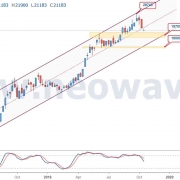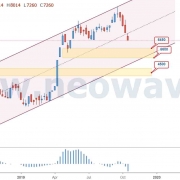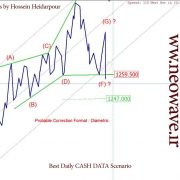(149) New Tips & Hints
Japan’s stock market has been in decline for 20 years. Is there a chance the U.S. will experience a similarly long, bear market or economic contraction?
ANSWER:
In early 2000, right as the U.S. stock market was peaking, I predicted the Dow, S&P and Nasdaq would drop 50%, 60% and 70% (respectively) within a few years. All three forecasts came true within less than 2 years. The only way the U.S. stock market could have dropped so much so fast is if a major, impulsive rally had ended at 2000’s high (the longer-term evidence suggests that high was the end of a 3rd wave, so let’s call it Cycle Wave-III).
Based on orthodox Elliott Wave, in a standard impulsion, no part of wave-4 can share any of the price range of wave-2. Adding to that foundation, NEoWave tells us wave-4 must also take more time than wave-3, but normally not much more than 161.8% of its time. Plus, wave-4 must retrace at least 33% of the price rally of wave-3 and produce a decline larger than any seen during the formation of wave-3. So, the minute the S&P retraced more than 33% of wave-III and dropped more (%-wise) than any correction within wave-III, the start of wave-IV was confirmed.
We know wave-III consumed 18 years, so simply “applying the rules” listed above, it was easy to “predict” wave-IV in the S&P would bottom ABOVE 400 (its low so far is 666 in March 2009) and that it would last at least 18 years. Rounding off the time consumed by wave-III, in early 2000, right as the bear market was starting, I stated wave-IV would last 20 years or more. Calculating 161.8% of the time of wave-III we get 29 years; as a result, standard NEoWave rules allow me to confidently state (not predict, because these are requirements of wave structure, not opinions) that wave-IV will last between 20 and 30 years. Since wave-IV began in 2000, it will not end until 2020, but could drag on until 2030!
So, clearly, the answer to your question is YES – the U.S. will experience at least another 10 years of economic contraction or stagnation, with our bear market eventually rivaling the duration of that which Japan has already experienced following their 1990 stock market top.











دیدگاه خود را ثبت کنید
تمایل دارید در گفتگوها شرکت کنید؟در گفتگو ها شرکت کنید.